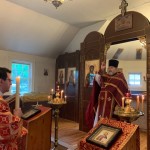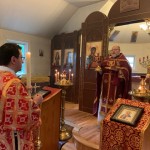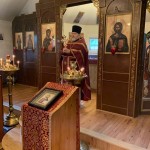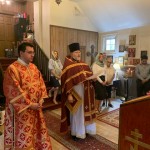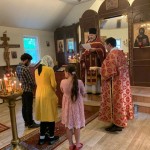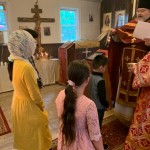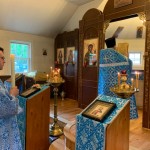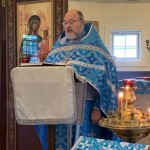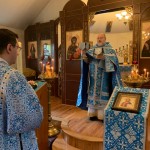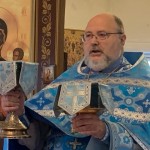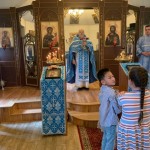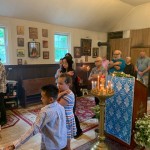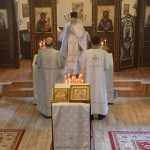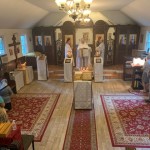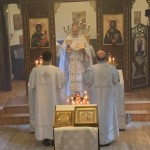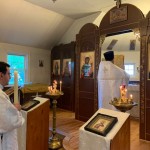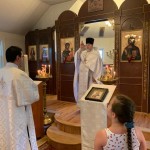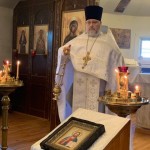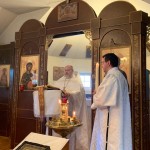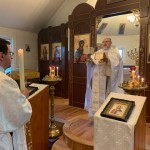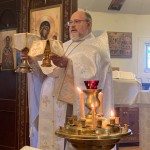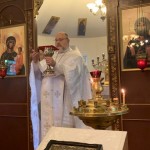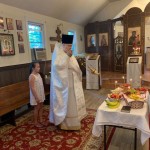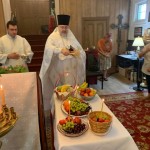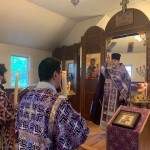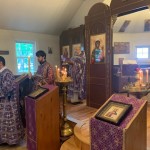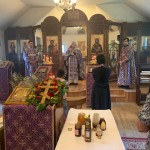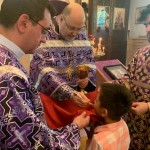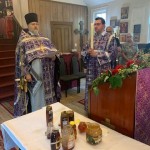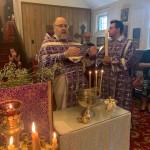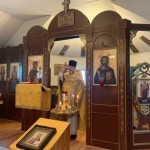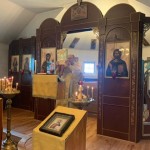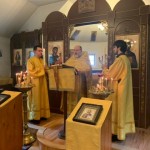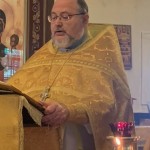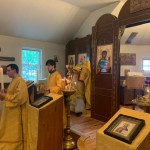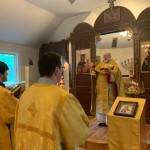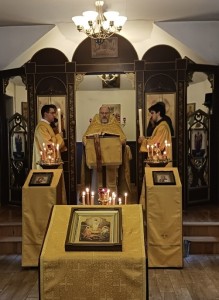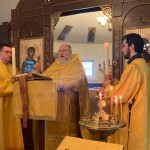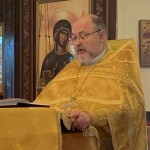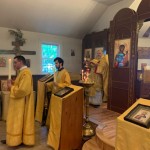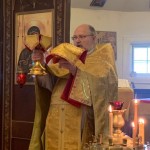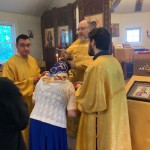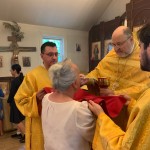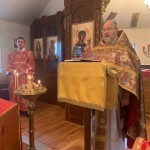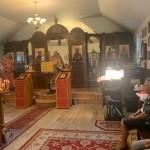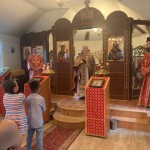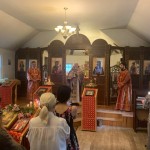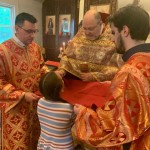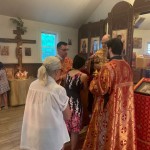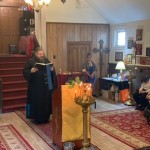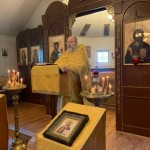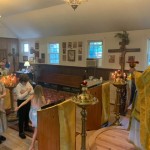On September 11, on the 13th Sunday after Pentecost, St. George Parish held a nice celebration. In addition to the Sunday observance we celebrated feast of the Beheading of St. John the Baptist. Our Rector, Archpriest Igor Tarasov served the Divine Liturgy. After the readings from the Scripture he preached the following homily in English:
“Dear brothers and sisters in Christ! Today we celebrate the 13th Sunday after Pentecost and the sorrowful feast of the Beheading of St. John the Baptist. The first Gospel tells the parable of the vineyard (Mt. 21, 33-42). We heard that story of the owner who built it and was sending his servants to get the fruits in due time. And we heard how the tenants, the vinedressers treated them, them and even the owner’s son. They killed the owner’s son. The second Gospel lesson told us how the holy and righteous man, St. John the Baptist, was executed (Mk. 6, 14-30). So, both Gospel readings today are about unjust killing, about wicked people murdering the innocent”.
“Unfortunately, it is very common in our life that unjust killings and terrible crimes take place. History of mankind is full of such transgressions. And we observe such things happening today. And we should not be surprised at that because this is part of the corrupted human nature. The son of the first man, the son of Adam, called Cain, became the first murderer. Murder is old as the humanity. But, on the other hand, when we hear about such iniquities or atrocities, we become shocked. And this is also because of our human nature. The same nature that is sick because of sin, is capable of terrible things, that same nature is containing the image of God and is called for goodness. And our nature, our soul, our feelings usually react at such things being shocked. Therefore, today we may reflect upon that call and upon what we are supposed to do to make the human kind better”.
“In today’s first Gospel parable, the vineyard is Israel. The owner is God. Israel is hedged around with natural borders. The winepress is the altar, the tower is the Temple. The tenants are the Jews. The servants are those sent by God, the prophets and holy ones who reminded the Jews that Israel was not theirs but God’s. But what did the Jews do? They beat and stoned and killed first the servants. Among them, St. John the Baptist was killed; king Herod ordered him to be beheaded. Then the heir, the Son of God, Jesus Christ was killed. Why? Because the Jews wanted everything for themselves. And so they ceased to be God’s people, they ceased to be Israel of God and were cast out of their land and scattered over all the face of the earth. Israel was given to others: the New Israel, the Church, was born”.
“This is why, we should realize that this parable is also addressed today to us, Orthodox of the New Israel. The vineyard is the planet where we Orthodox Christians live. It is hedged around by the presence of the Church. The wine-press is the altar. And the tower is the Church. And the servants are the Saints or the servants of the Church. And we Orthodox should ask ourselves how do we labor in the vineyard, how do we give the owner His share of grapes and how do we treat his servants? We should ask whether we do not want everything for ourselves forgetting about the true Owner and His rights. Do we act in a manner that suits us?”
“Going back to the Beheading of St. John, we may recall the specific reason why king Herod ordered to execute him. It was because the Holy Forerunner denounced the king for his sinful behavior. He said to Herod, “It is not lawful for you to have your brother’s wife” (Mk. 6, 18). Herod committed the sin against the last Commandment of God, he coveted his neighbor’s wife. He took the wife of his brother Philip. That was actually both stealing and adultery. Nowadays such a person would probably feel more protected because now we have such things as divorce, and theoretically, a woman can leave one man and marry his brother. But still, even in our days, certain things which may be viewed as normal for regular people, are not suitable for the leaders of the nations, especially the royalty. [Last week Elizabeth II, the Queen of England passed away. We may recall how strictly the society reacted to certain personal choices of the members of the British royal family]. That is because such people are held to a higher standard. And Herod did not live up to that standard. But since he wanted to continue to live a sinful life, that led him to the unjust killing of the righteous man who was so inconvenient to that king”.
“This is why, dear brothers and sisters, we should ask ourselves whether we do everything lawful, whether we do everything right and that suits us? Because if we don’t, we want this vineyard for ourselves and forget the true Owner. And if we talk about holding the kings to a higher standard, let us remember that our title, a title of a Christian person, a human being who is baptized and belongs to the Orthodox Church – that title is high enough to be held to an appropriate standard. If something is normal for faithless and adulterous generation of this world, it is not suitable for us. Otherwise, we are on the way of becoming like those wicked vinedressers who began to think that the vineyard belongs to them”.
“Dear brothers and sisters! Let us keep ourselves and our immortal souls to the higher standard. Let us worthily and diligently labor cultivating the vineyard of our life entrusted to us by God. Let us be attentive to God’s call and to His servants asking us for the share of the grapes. Let us honor the holy people, the Saints who passed from this life, people like Holy Forerunner and Baptist John. Let us also respect the servants of God sent to while we live – the priests and bishops of the Church. Let us finally honor and respect the Owner’s Son, the Son of God, our Lord Jesus Christ who was crucified for us because of the wicked people, but Who redeemed our souls to make us good workers of His new vineyard, the New Israel and then to make us worthy of His eternal blessedness!”
During preparation for Holy Communion the choir nicely performed the hymns of the feast of the Beheading of St. John the Baptist.
After the dismissal of the Liturgy the Rector and the altar server performed glorification in the middle of the church singing the troparion, kontakion and magnification of the feast before the icon stand.
Following that the Rector congratulated Moses Dunetz on his past name day. Traditional Polychronion (“Mnogaia leta!”) was proclaimed and the Theotokian prosphora was handed to that parishioner.
Following that the Rector performed the blessing of the students who begin the school year. He had a brief speech in Russian greeting the parishioners on the celebrated feast and expressing his wish that our Orthodox students will really embrace knowledge and wisdom through their school studies.

